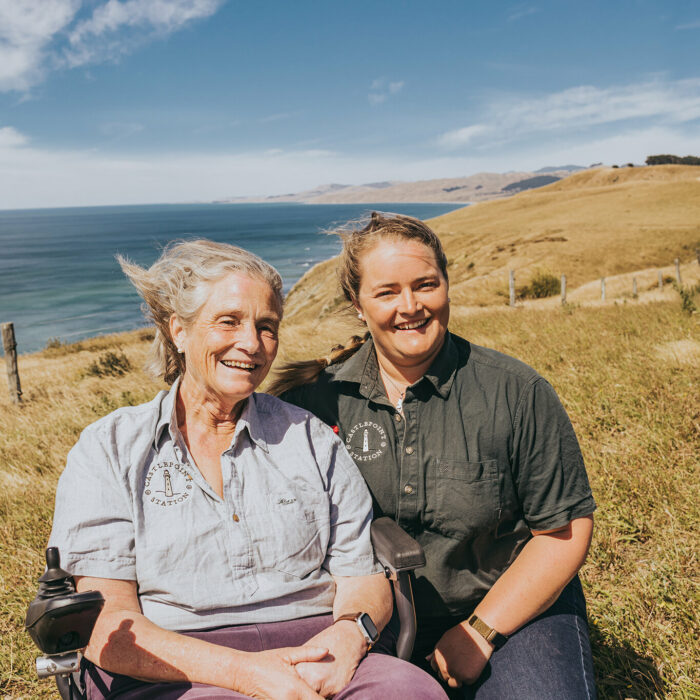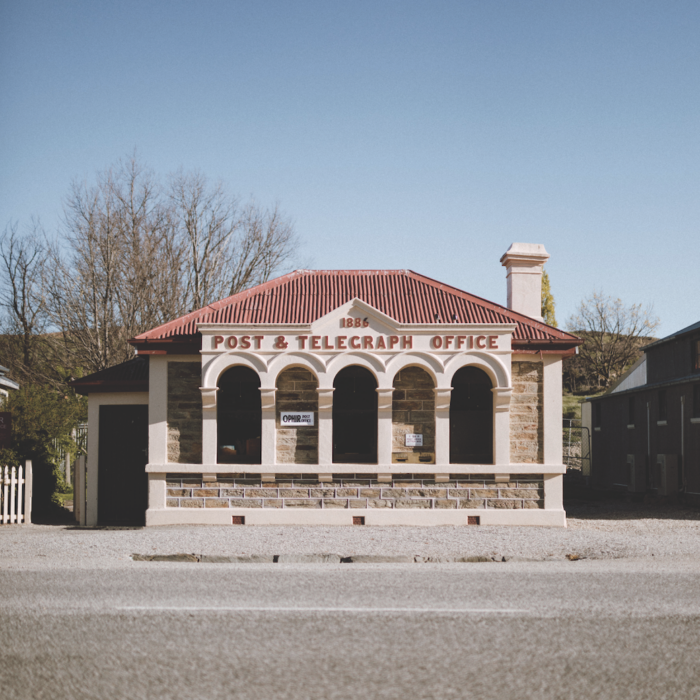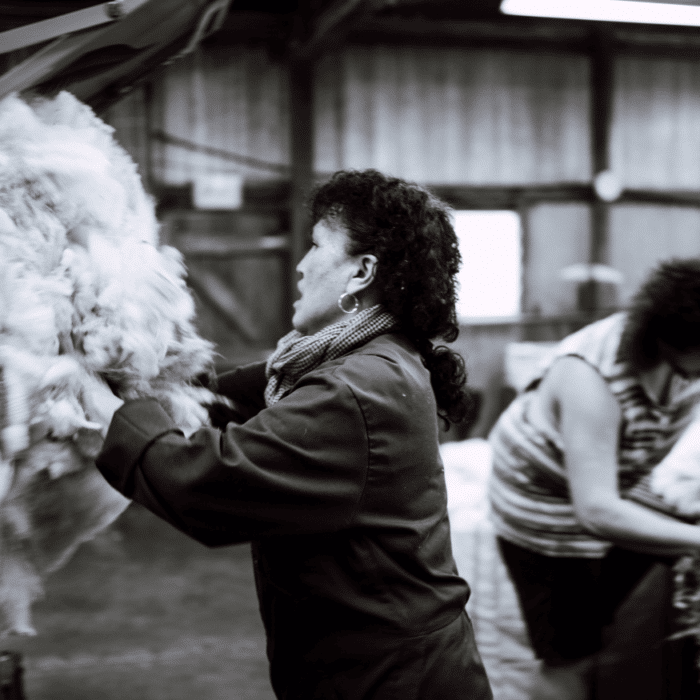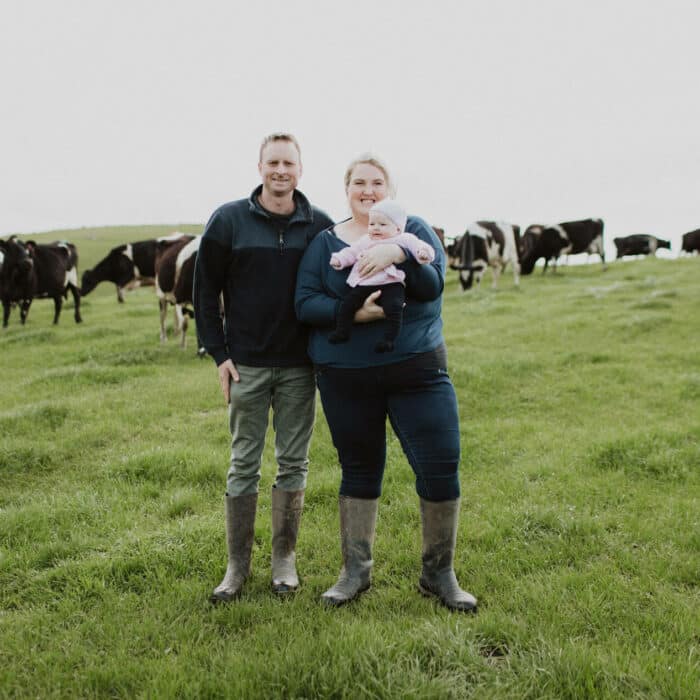
Tell us a little bit about yourself and your farm. I was a schoolteacher before I met my husband, Lance. I was teaching at Hāwera when I first moved to Strathmore, and drove forty-five minutes each way to school every day. When I got pregnant with Ellie, our first daughter, I stayed full time on the farm – we run a sheep and beef breeding operation, including a Hereford stud, on a total of 2,692 hectares.
Did it take you a while to get used to life on the farm? Lance’s family is really good; they were very supporting. You jump into the farm life, but you have to find out what works for you. It took a bit of muddling and getting used to things. It was hard to let go of teaching – I love feeling like I make a positive difference to people and really cared about my students, which was difficult to step away from.
How do you juggle everything on the farm with all your other responsibilities? I don’t know – I just have a lot of balls in the air all the time! I do anything I’m needed for on the farm. If we’re docking, I’m docking; if we’re shearing, I’m shearing – and cooking food, getting the kids to school, helping with homework and running all the books. I have a couple of dogs, so I do a bit of mustering. I also teach at the local school down the road every Friday. Life is hectic, but I try to stay ahead of deadlines and I fit my children in amongst work – they’ve all been dragged along from day one! There’s a bit of that mother guilt of not having time to shoot them into town for extracurricular activities, so a group of volunteers started Douglas Kids Club for local kids, where we offer different opportunities. Amongst all that, I try and get as much horse riding in as I can for my sanity!
Does coming from a non-farming background have its benefits? I think that has been a real strength. I had no preconceived ideas of how things should be done. I came in with a whole lot of optimism and open eyes; I would ask a lot of questions. Lance and I have some really rich conversations about why we do things. Last year I did a farming business programme sponsored by Rabobank, which focused on women understanding their farming business and their added value to the sector. It was a nice affirmation of the strengths women bring to farming.
You’ve recently been through farm succession planning. What prompted that? When Lance and I got engaged and I got pregnant with Ellie, the family started to think about succession. I got thrown into doing it. I feel really strongly it’s something that should be in the forefront of everyone’s family conversations from early on. From the get-go, Rabobank was integral in supporting us and challenging us to think about different ways in which succession could work for us.
How did you navigate the intersection of family and business? The first thing is to have a really clear idea of what people want out of it. If you’re guessing, you’re muddying the waters. I spent many a sleepless night thinking about possible ways to get to where everyone wants to be. Succession is someone’s entire livelihood. They’ve given their whole life to the farm and asking them to step back and give away all that – not just to their children, but to in-laws as well – is huge.
What made your situation tricky? Our larger farm, Aotuhia Station. It was the most valuable land, which generated the most income for our business. Lance’s twin brother, Lloyd, was living out there and managing that block. It is quite iconic, and the day my father-in-law bought that was his proudest moment. He had always envisioned both brothers sharing and working Aotuhia Station forever. However, with different goals and interests, it was not productive in supporting each family in their own direction. We were lucky to get an opportunity to purchase two adjoining blocks to our Strathmore farm. While this increased our debt, it enabled us to move forward with our succession plan in a positive direction that supported everyone’s connection, emotions, future interests and goals. Rabobank has been super open to helping find ways in which to make it happen; if we didn’t have a supportive, open-minded bank behind us that knows us and backs us, we wouldn’t have been able to make it happen.
Do you have any advice for young farmers looking into succession planning? It takes a lot of talking and making sure everyone is heading in the direction they want to get to. Being open minded and grabbing opportunities has helped us. If you fail to plan, be prepared to fail. Everything and every farm decision that is made – whether it be buying more land or a big capital development – needs to be geared toward the end game of succession. If you are planning with that in mind, it moves a lot more smoothly when the time comes.
Related Stories
Emily & Sarah
Twenty-two years ago, Emily and her husband moved their family from a 300 acre farm near New York to a 7,400 acre Castlepoint Station in coastal Wairarapa.
Ophir
Val Butcher, 81, the postmistress of the country’s oldest continuously running postal service, shares her memories of cold winters and fitting cabbages into postboxes.
Esther Kidd
The twenty-five-year veteran and Leading Charge Hand with Spain and Smith Shearing Contractors lays out what it takes to get through a day, and what keeps her going.
The course providing farming couples with the tools to make their businesses resilient, adaptable – and profitable
Ann and Scott took part in AWDT’s 'Our Resilient Farming Business' course.
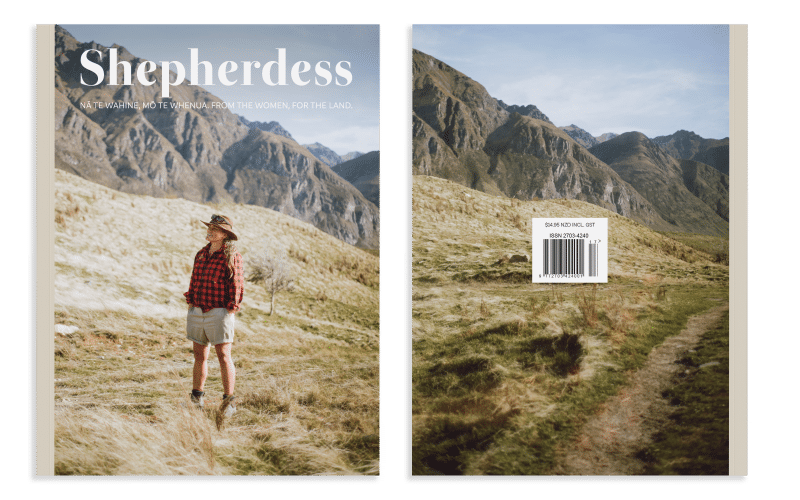
Out Now
Seventeenth Edition
Our beautiful Ngahuru Autumn 2024 Edition is out now!
